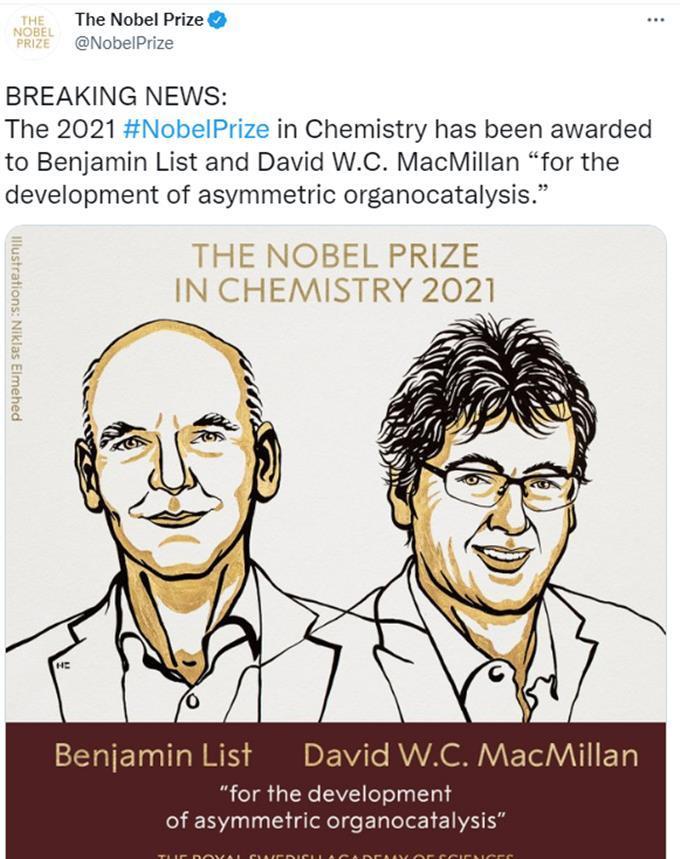Jimu news reporter Sun Zhe Hu Li
According to the official website of the Nobel Prize, the results of the 2021 Nobel Prize in Chemistry were announced at 17:45 Beijing time on October 6, and the Royal Swedish Academy of Sciences announced that the prize was won by German scientist Benjamin List and American scientist David W.C. MacMillan, who were awarded the 2021 Nobel Prize in Chemistry for their important contributions to the "asymmetric catalysis of organic small molecules".

Source: Social Media
What are these two scientists?
Public information shows that Benjamin Lister, born in Frankfurt in 1968, is a German chemist. He studied chemistry at the Free University of Berlin, received his Ph.D. from the University of Frankfurt in 1997, and then did postdoctoral research at the Scripps Institute in the United States as an assistant professor. Lister joined the Max Planck Coal Institute in 2003 and was promoted to professor in 2005.
Benjamin Lister, who is mainly engaged in organic catalysis and synthesis, is one of the pioneers in the field of asymmetric organic catalysis, and he has developed a new asymmetric catalytic mode: chiral counter-anion-oriented asymmetric catalysis. Chiral characteristics, which are the relationship between the left hand and the right hand, can coincide mirrorwise and cannot be completely overlapped spatially.
Benjamin Lister (left) and David Macmillan (right) (Source: Reuters)
David Macmillan, born in Scotland in 1968, is an American organic chemist and professor at Princeton University, where he served as chair of the Department of Chemistry from 2010 to 2015.
Macmillan chose to leave the UK after earning a bachelor's degree in chemistry from the University of Glasgow, where he traveled to the United States to begin his doctoral studies under the direction of Professor Larry Ofman of the University of California, Irvine, where he received his PhD in 1996.
In July 1998, Macmillan began his independent research career as a member of the Department of Chemistry at the University of California, Berkeley. In June 2000, he joined the Department of Chemistry at caltech, where he and his group focused their research interests on new methods of enantioselective catalysis.
Macmillan's team has made many advances in the field of asymmetric organic catalysis and has applied these new methods to the synthesis of a range of complex natural products.
What is "organic small molecule asymmetric catalysis"?
Due to the rewards of many work intersecting with chemistry in the past, the Nobel Prize in Chemistry was once considered to be the "Science Award", and this year's award was "Asymmetric Catalysis of Organic Small Molecules", and many people, especially chemists, believe that this is a return to traditional chemistry.
Constructing molecules is a difficult art, and Benjamin Lister and David Macmillan have developed a new tool for precise molecular construction: organic catalysis. CNN reported that Nobel Prize committee member Penella Wieton-Stavschede said the duo's discovery "opens up a whole new mindset for how to 'assemble' chemical molecules."
"This new 'toolbox' is widely used today in a wide range of fields, such as drug discovery and fine chemical production, and it also greatly benefits humanity." Witton-Stavschede added.
All aspects of life are inseparable from the construction of molecules, from storing energy in batteries to inhibiting the deterioration of diseases. This work, in turn, requires catalysts that can control and accelerate chemical reactions, but will not become the ultimate part of the product.
Researchers have long believed that there are only two types of catalysts, metals and enzymes. In 2000, Lister and Macmillan each discovered a third catalyst, also known as asymmetric organic catalysis.
It is understood that in the past 20 years, this new catalyst has been applied in a number of fields, including molecules used to make new drugs and capture light in solar cells. The Nobel Committee on Chemistry praised the two of them as "bringing great benefits to humanity".
Screenshot of related reports (Source: CNN)
CNN reported that Lister was drinking coffee with his wife at a coffee shop when he received a call from the Nobel Prize committee. Lister said: "There was a Swedish call on my phone screen, I looked at my wife, my wife looked at me, and the next second I ran out of the coffee shop. You know, it's really amazing, it's so special. ”
For more exciting information, please download the "Jimu News" client in the application market, please do not reprint it without authorization, welcome to provide news clues, and pay as soon as you adopt it. 24-hour reporting hotline 027-86777777.